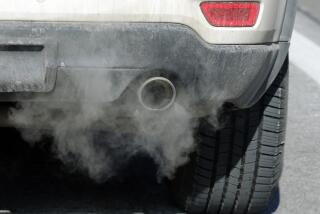Anti-Theft Codes Collide With Smog Device Plan
A federal proposal to give independent auto repair shops equal access to the same computerized codes as auto dealerships aims to make it easier for motorists to obtain essential servicing of their vehicles’ anti-pollution systems.
But there is a potential downside, according to insurance sources and other critics, who worry that the information could fall into the hands of car thieves and allow them to override factory-installed anti-theft devices that immobilize vehicle engines.
If the Environmental Protection Agency decides to publish the codes pertaining to automotive onboard diagnostic systems--and with those codes, data pertaining to so-called passive immobilizing anti-theft devices--”it would be like handing over to car thieves the keys to millions of vehicles nationwide,” said Russ Rader, a spokesman for the Highway Loss Data Institute.
Publishing the OBD codes and making them available on the Internet to any repair facility would make it “difficult, if not impossible, to confine this information to appropriate employees,” said Kim L. Hazelbaker, senior vice president of the institute, a nonprofit insurance industry organization in Arlington, Va.
The result could be that “people involved in vehicle theft would have access to the information and use it to steal vehicles,” he wrote in a letter to EPA Administrator Christie Whitman.
The EPA’s proposed rule change, which would be included in amendments to the Clean Air Act, is designed to level the playing field for independent auto repair shops in fixing emissions-related problems.
Mark Lauver, owner and manager of King Kar Auto Service in Lawndale, doubts there is much risk of widespread theft if the codes and data are made available to independent shops such as his. The government will find a way to safeguard the information, he said, asserting that opposition to the proposal is fueled more by fears of competition.
“I doubt they are terribly concerned about theft,” he said, referring to auto manufacturers and dealers. “Access to all that information would make it easier to repair vehicles for our customers,” said Lauver, a member of the Automotive Service Councils of California, which supports the rule change.
Owners of late-model vehicles do not have the option of going to an independent shop for certain repairs that require the ability to read the codes generated by engine-control modules. Their only choice is use the service department at a dealership.The Highway Loss Data Institute appreciates those concerns, Hazelbaker said, but “we would like EPA to exempt any codes that would have to do with anti-theft devices.”
Engine-immobilizing devices are the “sole piece of technology that has been protecting some of these high-end targeted vehicles,” he said, noting that institute studies have found significant decreases in vehicle theft losses when factory-installed passive devices are introduced.
The devices arm automatically when the vehicles are locked. Ford Motor Co.’s Securilock system, which the auto maker introduced on some high-end 1996 models, is activated when the driver removes the key from the ignition. The system features a computer chip programmed with a security code embedded in the ignition key. If someone tries to start the vehicle without the correct key, the system disables the engine.
For now, industry groups are pressing for compromise.
Michael Cammisa of the Assn. of International Automobile Manufacturers said that if auto makers were given sufficient lead time, OBD systems could be redesigned to separate the codes for anti-theft immobilizers and emissions systems. It is the potential for vehicle theft--not business lost to independent shops--that concerns his group, he said.
When the latest anti-theft devices were developed, Cammisa said, manufacturers believed there would be little access to the codes and related data. They put checks in place at dealerships to keep the information out of the wrong hands, but they cannot maintain the same control at other repair facilities, he said.
Ana Lopes, Washington-based director of government relations for the Motor and Equipment Manufacturers Assn., said her group supports independent shops receiving information that will enable them to perform repairs and build parts. But she insists that “we are not seeking codes that would in any way endanger the safety of the vehicle or override the anti-theft systems.”
Meanwhile, the California Air Resources Board is working on a proposed rule in response to state legislation passed last year. That legislation specifically requires “that independent parts manufacturers be provided with the information necessary to manufacture and remanufacture parts that are compatible with and monitored by the OBD system,” Lopes said. A final rule is expected in December.
*
Jeanne Wright cannot answer mail personally but responds in this column to automotive questions of general interest. Write to Your Wheels, Business Section, Los Angeles Times, 202 W. 1st St., Los Angeles, CA 90012. E-mail: jeanrite@aol.com.






